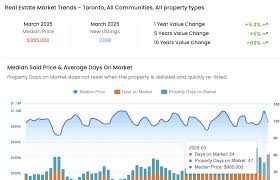The Current State of the Toronto Housing Market in 2023

Introduction
The Toronto housing market has been a topic of significant discussion and concern for homeowners, buyers, and investors alike. As one of Canada’s largest cities, Toronto’s housing dynamics can influence national trends, making understanding its current state vital for anyone involved in real estate. Recently, the market has shown signs of both recovery and continued volatility, drawing the attention of economists, potential homebuyers, and policymakers.
Market Trends and Current Data
As of recent data from the Toronto Regional Real Estate Board (TRREB), Toronto’s housing prices have seen fluctuations, with an average home price recorded at approximately $1.1 million in September 2023, a slight decrease from earlier in the year when prices peaked around $1.2 million. This represents a year-over-year increase of about 5%, indicating both resilience and challenge in affordability.
Market analytics reveal a mixed bag of demand and supply metrics. Despite interest rates remaining relatively high, home sales have shown an incline. September 2023 saw over 6,200 sales, a notable 10% increase compared to the same month in 2022. However, listings remain lower than expected, driving competition and pushing some buyers to the sidelines.
Factors Influencing the Market
Several factors are shaping the current Toronto housing market. High interest rates continue to limit purchasing power for many potential buyers. The Bank of Canada has opted for a cautious approach amidst economic uncertainty, leaving rates in a higher range than in previous years. Additionally, ongoing immigration has bolstered demand, further straining the limited housing stock.
Developers are responding with new construction projects aimed at increasing supply, but delays and rising material costs have hampered progress. The city’s commitment to expanding public transit and infrastructure may make certain neighborhoods more appealing in the eyes of buyers, thus impacting housing values in those areas.
Conclusion
In summary, the Toronto housing market remains dynamic, characterized by a mixture of high demand and constrained supply. As economic conditions evolve and interest rates fluctuate, prospective buyers and current homeowners must stay informed about these trends. Analysts suggest that while the market may continue to see price adjustments, long-term growth remains likely due to the fundamental demand for housing in Canada’s largest city. Observers recommend potential buyers to act with caution – while opportunities may present themselves, careful financial planning is more essential than ever.









